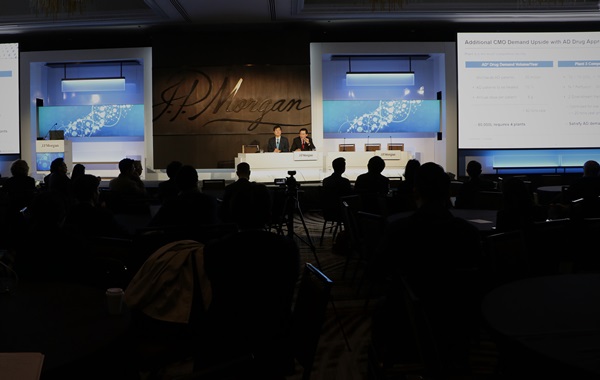Korean pharmaceutical and biotech companies showed off their technological prowess at J.P. Morgan Healthcare Conference, which ran in San Francisco, the U.S, from Sunday through Thursday.
Some introduced flagship pipelines to look for business partners, and others announced plans to tap the global market, including the U.S. and China.
Most of the Korean firms held investor relations briefings on Wednesday, the third day of the 38th annual healthcare investment symposium.
Genexine, Hugel, LG Chem, Samsung BioLogics, Celltrion, Hanmi Pharmaceutical, and Daewoong Pharmaceutical presented major investigational drugs and their blueprints for business expansion.

Celltrion targets China, Samsung BioLogics, US
Celltrion and Samsung BioLogics, the only two companies that gave main track presentations among Korean firms, drew attention with their plans to enter the Chinese and the U.S. market, respectively.
Celltrion said it would directly enter China by building a biopharmaceutical manufacturing plant capable of producing 120,000 liters of biomedical drugs. The company did not reveal the location of the plant.
Celltrion planned to team up with Hong Kong-based multinational firm Nan Fung Group to tap the Chinese market and established a joint venture, Vcell Healthcare, last July. However, the Korean company recently parted with Nan Fung because the two could not narrow different opinions about constructing a biopharmaceutical manufacturing facility, news reports said.
Instead, Celltrion agreed with the Chinese government to establish a production site and is in the final stage of signing the contract. Just as it did in Europe, the company plans to sell biopharmaceuticals directly in China. Celltrion said it would prepare production and sales, in line with the schedule of Remsima trials in China.
Celltrion announced that it would join the diabetes treatment market, in addition to autoimmune diseases and cancer.
Celltrion Chairman Seo Jung-jin said, “We will advance into the diabetes market through technology adoption and self/joint development and grow into an insulin biosimilar leader.”
The global diabetes market is worth about 46 trillion won ($39.7 billion), according to Celltrion.
Samsung BioLogics said it would open a research lab in San Francisco to expand its global business in contract development and manufacturing.
Since its establishment, the company has focused on contract manufacturing organization (CMO) business. In 2018, Samsung BioLogics added contract development organization (CDO) business to develop clients’ cell lines and clinical substances.
As the company plans to add a contract research organization (CRO) business, it will be able to provide a “one-stop service,” which can cover all new drug development stages from clinical trials to licensing and production. Thus, it can offer not only mass production but for small CMO projects, the company said.
Establishing a research lab in the U.S. aims to meet the rising demand for CDO services and maximize profits, Samsung BioLogics said. The company is mulling to set up additional subsidiaries in Europe and Asia, following one in the U.S.
Hanmi, LG focus on promoting key pipelines
Hanmi Pharmaceutical, LG Chem, and Genexine concentrated on promoting their essential experimental medicines.
Hanmi picked eight agents as key drug candidates among 29 pipelines. The eight agents include first-in-class drug candidates such as non-alcoholic steatohepatitis (NASH) treatment HM15211 (LAPS Triple Agonist), dual mechanism obesity treatment HM12525A (LAPS Glucagon / GLP-1 Dual Agonist), and once-a-week obesity treatment HM15136 (LAPS Glucagon Analog).
Multinational drugmakers showed keen interest in the NASH treatment HM15211. In treating NASH, it is important to improve several indicators such as fatty liver, inflammation, and fibrosis simultaneously. Hanmi said its investigational treatment showed multi-effects, including a rapid reduction in fatty liver in the multiple ascending doses (MAD), phase-1 trial.
“In the liver fibrosis model, the drug candidate suppressed hepatic stellate cell activation and significantly improved fibrosis symptoms. It also lowered inflammatory cytokines,” Hanmi Pharmaceutical President Kwon Se-chang said. “We plan to launch a global phase-2 study in the second quarter for NASH patients who are verified by biopsy.”
Another critical candidate, HM12525A, is antidiabetic obesity treatment. Last year, Janssen returned its development rights to Hanmi. Janssen in-licensed it from Hanmi in December 2016 but handed back the rights to Hanmi after completing a global phase-2 study. The trial results on blood glucose control in obese patients accompanying diabetes fell short of Janssen’s internal standards.
Unlike Janssen’s initial goal to develop it as a drug for both obesity and diabetes, Hanmi plans to develop it as an obesity treatment with dual mechanisms. The decision is based on the phase-2 outcome that reached the weight loss goal. Hanmi said HM12525A demonstrated a two-digit weight reduction, compared to Saxenda (ingredient: liraglutide), in a study.
LG Chem presented the results of phase-2 studies on gout and chronic inflammatory disease treatments. The company invested 165 billion won in life science R&D last year, expanding new drug projects from 30 to over 40.
LG Chem’s experimental drug for gout inhibits the protein, xanthine oxidase, which is involved in the excessive production of uric acid.
“The results of pre-clinical and phase-1 trials, the drug lowered the chance of side effects such as cardiovascular disease, which had been a shortcoming of existing uric acid inhibitors. It also reduced uric acid, the cause of gout, significantly. Hence, we anticipate for its distinguished efficacy and safety,” said Son Jin-woong, head of LG Chem’s Life Science Business Division, during his presentation.
Genexine promoted hyleukin-7 and GX-188E, an HPV (human papillomavirus) therapeutic vaccine, at the conference.
The company had been expected to disclose the interim results of the phase-2a trial on combination therapy of GX-188E and immunotherapy Keytruda in patients with HPV at the J.P. Morgan conference.
However, it said it would do so at the upcoming American Association for Cancer Research (AACR) annual meeting in San Diego in April.

